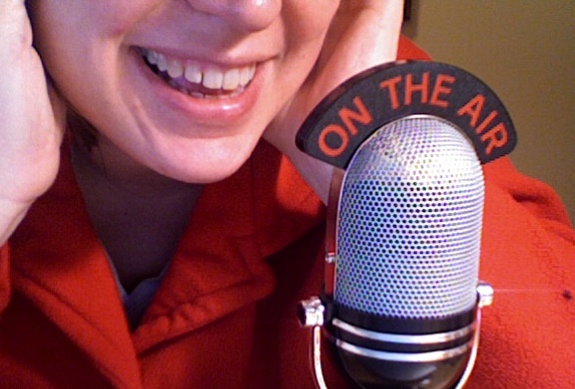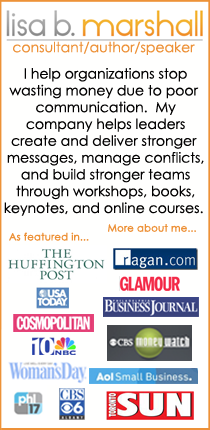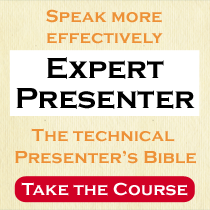How fast do I speak?

When I am making presentations about public speaking or delivering a podcast (yes, that really is me in the picture above), I often talk about the perceptions formed based on the rate of speech of the presenter. Inevitably someone in the audience asks me,
“Lisa, how fast do YOU speak?”
If you have attended one of my Smart Talk keynotes or workshops, spoken with me on the phone you , or listened to one of my podcasts, you would know that my natural rate of speech is quite fast. When making presentations I speak at approximately 145-160 words per minute (wpm), while an average American English speaker engaged in a friendly conversation speaks at a rate of approximately 110–150 wpm. (Interestingly, publishers recommend books on tape to be voiced at 150-160 wpm, auctioneers are generally 250-400 wpm while the average reading rate is about 200-300 wpm).
However, as you may know, people speak at different rates at different times. Natural speech includes bursts of more rapid speech and in addition, we are all capable of speaking faster and slower when we want. Of course, there are also variations in speed associated with the situation in which the speech is being produced.
We speak more rapidly if we are in a hurry, or saying something urgent, or trying not to be interrupted in a conversation. For many people, nervousness or excitement will also increase the rate of speech. Conversely, we tend to speak more slowly when we are tired or bored. I know for me, I tend to talk more slowly and with more non-words (um, ah, pauses, etc.) when making impromptu presentations and while practicing delivery of new presentation materials. Clearly the emotional state of the speaker greatly influences the rate of speaking.
Finally, I think there is also a cultural and personal element. In some places such as New York City, people tend to naturally talk faster, while in other locales people talk much slower. Culturally, if English isn’t the speakers first language, that can also slow down the rate of speech. In addition, some people are naturally fast talkers, while others habitually speak slowly. I was a fast talker even as a child. My mother was constantly telling me to slow down and breathe!
Are you a Smart Talker? Take the Smart Talk Quiz!
How do you calculate how fast you speak?
We are used to measuring the speed at which someone can type, write or take shorthand dictation in terms of how many words per minute are taken down. Some adjustment usually has to be made to penalize someone for going so rapidly that they make mistakes. In measuring speech, we can do the same thing – we can give someone a speaking task such as describing what their research is or what they did on their last vacation – and count how many words they speak in a given time period.
So, are your ready to calculate your speech rate? You have two options. The first option is a more accurate measure of your speech rate, but requires you to speak extemporaneously about a topic for one minute. While the alternative method, isn’t quite as accurate, but does give you a general idea of your speech rate.
Option One: Record, Talk and Count
Take out your tape recorder. Think of a topic you have a genuine interest in…your family, your research, and your favorite hobby. Once you are ready, begin speaking and begin recording yourself. Be sure to speak for at least one minute on the topic. Then using the rewind function, play the tape back several times to count the number of words you uttered in one minute. It is even better if you extemporaneously present and record one minute of your most recent presentation. This way, your score will be a more accurate measure of your “presentation” speech rate.
[August 2013 Update: I originally wrote this article in the early 90’s before the internet! Yes, really! I posted it here to this website — I think– in 2008 or so. In any case, I’m just now re-reading this section and I realize that no one actually uses tape recorders anymore! The best way to do this would be simply to use a mobile device that will convert your speech to text. Just talk for one minute and capture the text. Then cut and paste the text into a Word document and use the tool to count the words!]
Option Two: Read and Count
For those of you that would prefer not to record yourself, here is another way to measure your speech rate. Read the following “test” paragraph aloud. Try to pace yourself as if you are presenting or talking at your “normal” rate. This method isn’t as accurate but it is easier to count.
Start “presenting” the paragraph below. See how far you get after a minute has gone by. Count the number of words you were able to express in one minute. This is your presentation speech rate.
Start your timing, then stop, after one minute.
This begins my test of my presentation speech rate. Using this method, I will measure my speech rate by reading the following sentences as if I am actually speaking in my normal manner.
In our lab, we are determining what is required to turn designed proteins into active enzymes. Specifically, I am working with Bill Smith to add the functions of dinuclear enzymes to our designs. Our work has the potential to create small enzymes capable of replacing large natural ones that are difficult to express and purify.
We found that opening the active site to substrate required using smaller side chains that resulted in destabilization of the protein structure.
(Word count 110)
A detailed analysis suggested that we could stabilize the new enzyme structure by reengineering the turn in our protein.
(Word count 129)
We demonstrated that the new enzyme adopts the desired conformation and can perform several reactions naturally catalyzed by much larger proteins.
(Word count 150)
This work demonstrates that we can design new active sites, and is the first step to the design of active sites capable of novel chemistry.
(Word count 175)
This is a test. This is only a test of my speech rate.
~end~ (Word count 183)
Does speaking quickly or slowly matter?
Yes! It does. Research has shown that speaking rate influences perceptions. In fact, a positive linear relationship has repeatedly been found between speech rate and perceived competence. In fact several studies found that faster rates of speech are associated with perceptions of competence, extraversion, and social attractiveness. In other similar studies, listeners rated competence and social attractiveness higher for those speakers whose perceived and actual speaking rates were similar to their own than to those whose rates they believed to be different from their own.
Obviously, other factors also influence perceptions of competence, extraversion and social attractiveness. What is important to remember is that your rate of speech does have an impact on the perceptions of your audience.
Want to better manage the perceptions of others? Do you struggle with difficult conversations? Do you procrastinate when it comes to delivering feedback? Do you know how to effectively persuade and influence others? Learn this and more in Smart Talk.
I’d like a signed copy!
Let me hear an excerpt
Let me read an excerpt
So what is your rate of speech? Let us know in the comments.
If you enjoyed this post, you should also read:
How to Expand Your Business through Public Speaking












There are 34 comments .